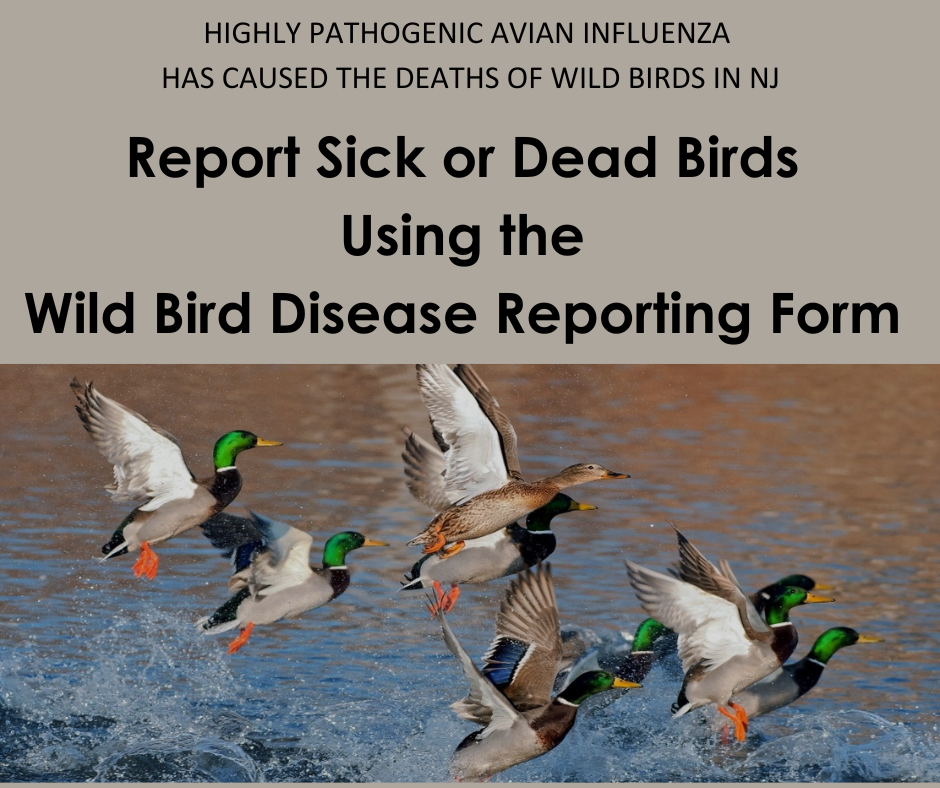WILD BIRD DISEASE REPORTING FORM
Report sick or dead birds using this form.
FAQ’s
What is H5N1?
Highly Pathogenic Avian Influenza (H5N1), or “bird flu,” is a respiratory disease of birds caused by influenza A viruses. Wild birds, such as ducks, gulls, and shorebirds, can carry and spread these viruses but may show no signs of illness. However, avian influenza can kill domestic poultry (such as chickens, turkeys, ducks, and geese). Typical clinical signs of H5N1 include diarrhea, discharge from the nose, coughing, sneezing, and incoordination, but some birds may show no signs before death. There may be multiple sick or dead animals in a single location.
Avian Influenza continues to infect wild birds and mammals across the US. Avian influenza is caused by an influenza type A virus that is carried by free-flying waterfowl, waterbirds, and shorebirds, but can also infect domestic poultry (chickens, turkeys, pheasants, quail, domestic ducks, geese, and guinea fowl), raptors, corvids, and mammals. Some infected wild birds can carry these viruses without getting sick, but domestic poultry and many species of wild birds, particularly raptors and corvids, can get very sick and often rapidly die from these viruses. Songbirds and other passerine birds do not appear to be highly susceptible to infection at this time. For prompt early detection, New Jersey DEP Fish and Wildlife focuses surveillance efforts on large mortality events in wild birds. At this time, we will not routinely test individual birds found dead but are focused on highly susceptible and imperiled wildlife species including bald eagles. Once the presence of the virus has been established in an area, additional testing may not be necessary.
Highly susceptible species include waterfowl (wild ducks, geese, swans), raptors (eagles, falcons, owls, hawks), scavengers (vultures, crows, ravens), gulls and other waterbirds. Songbirds, including cardinals and robins, are not considered to be highly susceptible to H5N1. Wild birds are susceptible to several diseases in addition to avian influenza including West Nile virus, mycoplasmosis, aspergillosis, and botulism, that can cause mortality. Wildlife mortality can be natural and not always due to an infectious disease. Wild birds, including waterfowl and shorebirds, are considered natural carriers of avian influenza. Since the beginning of the U.S. outbreak in January 2022, avian influenza has impacted wild and domestic birds in every state. Occurrences can be monitored here: USDA APHIS | 2022 Detections of Highly Pathogenic Avian Influenza .
What Agencies are Responding to the Outbreak?
On March 17, 2025, the U.S. Centers for Disease Control and Prevention declared that the ongoing nationwide H5N1 outbreak is primarily an animal health issue that poses low risk to the health of the public. The three principal state agencies involved in monitoring and responding to avian influenza are NJDEP Fish & Wildlife, the New Jersey Department of Health, and the New Jersey Department of Agriculture, which provide the following updates:
- New Jersey Department of Environmental Protection Fish & Wildlife reports that avian influenza is currently widespread in wild birds statewide.
- The New Jersey Department of Health continues to closely monitor H5N1 and collaborate with state and federal partners on preparedness and response to H5N1. There are no reports of H5N1 in humans in NJ, but the virus has been detected in multiple domestic cats: H5 Highly Pathogenic Avian Influenza Confirmed in New Jersey Cat
- The New Jersey Department of Agriculture reports that there have been reported cases in domestic poultry in Union, Mercer, and Hudson Counties in 2025.
The state maintains a comprehensive website with the latest information on HN51 avian influenza at: https://www.nj.gov/H5N1/
What Do You Do if You See a Group of Sick or Dead Wild Birds?
Please fill out the Wild Bird Disease Reporting Form .
How Do I Report Sick or Dead Domestic Birds?
If you are reporting sick or dead domestic poultry, please call the New Jersey Department of Agriculture Division of Animal Health at (609) 671-6400.
What if I Have Questions About Human or Domestic Pet Health Due to H5N1?
If you have questions about human or domestic pet health due to H5N1, please direct your questions to your local health department .
What are Disposal Options for Property Owners?
While NJ DEP Fish & Wildlife does not advise that the public handle sick or dead wildlife, if you have a dead bird on your property and are electing to dispose of the carcass, precautions should be taken:
- PPE should be worn, including gloves, a mask, and eye protection.
- Avoid direct contact between you and the animal by using a shovel to move the carcass.
- Double-bag each bird, close the bag using a zip-tie, and place in an outdoor trash bin inaccessible to pets and other wildlife.
- Following disposal, immediately wash your hands with soap and water and disinfect any non-disposable items using a diluted household bleach solution. Allow the disinfectant to sit on the item for 10 minutes before rinsing with warm water.
Residents can also contact their local municipality or county to inquire about animal control services or private wildlife control services able to dispose of dead wildlife.
Information for Hunters
Although highly pathogenic avian influenza is primarily a poultry disease, wild birds appear to play some role in its spread. Risk to hunters appears low, but there is no guarantee that there is no risk.
When Dressing Game Birds
- Always wear disposable gloves when handling or cleaning game and wash hands with soap and water immediately afterward. If soap and water are not available, use an alcohol-based hand sanitizer.
- Dress game birds in the field whenever possible.
- If you can’t dress birds in the field, clean them in a location away from poultry and other birds.
- Keep a separate pair of shoes to wear only in your game cleaning area. If this is not possible, wear rubber footwear and clean and disinfect your shoes before entering or leaving the area.
- Use dedicated tools for cleaning game, whether in the field or at home. Do not use those tools around poultry or pet birds.
- Double bag the offal and feathers. Tie the inner bag, take off your gloves, and leave them in the outer bag before tying it closed. Then wash your hands or use hand sanitizer.
Protecting Yourself
Although avian influenza viruses rarely infect people, you should still protect yourself. To reduce your risk:
- Do not eat, drink, or put anything in your mouth while cleaning or handling game.
- Avoid cross-contamination. Keep uncooked game in a separate container, away from cooked or ready-to eat foods.
- Cook game meat thoroughly. Poultry should reach an internal temperature of 165 °F to kill disease organisms and parasites.
Municipal and County Resources
Outreach Toolkit
NJDEP Fish & Wildlife continues to aggressively monitor Highly Pathogenic Avian Influenza (H5N1) in wild birds in New Jersey. To ensure residents across the state have the most up to date information regarding H5N1, the following outreach materials have been developed for municipalities and counties to use to keep their communities informed. These materials contain the most current information available and will be updated as necessary.
Social Media Content
Use this text, graphics, links, and tags on your municipality or county’s social media platforms.
Highly Pathogenic Avian Influenza (H5N1) has caused the deaths of wild birds across New Jersey and is being monitored by NJDEP Fish & Wildlife and federal partners.
If you see sick or dead birds, particularly in groups of 5 or more, please report your finding in the new Wild Bird Disease Reporting Form: https://survey123.arcgis.com/share/749040214c974bb88c89c58483a51ab8?fbclid=IwY2xjawJRHHFleHRuA2FlbQIxMAABHW7wqYL2I5s1s2GN66zz7cSuUmn7QjCyK9oVd78aDcH8-cD0y9T2ALQqwg_aem_9dVzlS0x3pyN9v0V9noNUA
Photos are encouraged, and all reports are reviewed by agency staff.
While H5N1 can infect humans, the U.S. Centers for Disease Control and Prevention has declared that the ongoing H5N1 outbreak is primarily an animal health issue that poses low risk to the health of the public. There are no reported cases of human infection in NJ.
Your input is critical for NJDEP Fish & Wildlife’s response to potential disease outbreaks in New Jersey’s wild bird population. The valuable information you provide through the Wild Bird Disease Reporting Form will add to data on wild bird health and mortality in the state.
More information: https://njdepwptest.net/njfw/highly-pathogenic-avian-influenza/
#NewJerseyFishAndWildlife #H5N1 #AvianInfluenza #BirdFlu
Email / Newsletter Content
Include text, links, and image in municipal and county newsletters or emails.
HIGHLY PATHOGENIC AVIAN INFLUENZA (H5N1) HAS CAUSED THE DEATHS OF WILD BIRDS IN NEW JERSEY.
Highly Pathogenic Avian Influenza has caused the deaths of wild birds across the state and is being monitored by NJDEP Fish & Wildlife and federal partners. If you see sick or dead birds in your community, particularly in groups of 5 or more, please report your finding in the new NJDEP Wild Bird Disease Reporting Form. Photos are encouraged, and all reports are reviewed by agency staff.
While H5N1 can infect humans, the U.S. Centers for Disease Control and Prevention has declared that the ongoing H5N1 outbreak is primarily an animal health issue that poses low risk to the health of the public. There are no reported cases of human infection in NJ.
Your input is critical for NJDEP Fish & Wildlife’s response to potential disease outbreaks in New Jersey’s wild bird population.The information you provide through the Wild Bird Disease Reporting Form will add to data on wild bird health and mortality in the state.
For more information visit: NJDEP| Fish & Wildlife | Highly Pathogenic Avian Influenza
Community Signs
Display informational signs as necessary in areas of public activity such as community parks and recreation areas. The three sign options below are available to download and print and may also be used on municipal and county websites. There is one full color sign, and two black and white versions. All of the signs contain consistent messaging and important information, but offer different layouts for ease of use.
Additional Resources
The State of New Jersey | H5N1
USDA APHIS | Highly Pathogenic Avian Influenza (HPAI)
USDA APHIS | 2022 Detections of Highly Pathogenic Avian Influenza
USDA APHIS | Avian Influenza and Wild Birds
January 17, 2025 – Murphy Administration Updates Public on Steps Being Taken to Track and Respond to H5N1 Avian Influenza
 Official Site of The State of New Jersey
Official Site of The State of New Jersey

